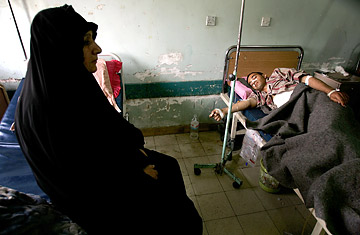
A woman sits near her relative, injured during clashes between Mahdi Army fighters and Iraqi forces, at a hospital in the Shiite district of Sadr City on March 26, 2008 in Baghdad, Iraq.
As Iraqis digested the news of their government's major military offensive against the Mahdi Army in Basra, there were mixed reactions. There was anger and resentment among poor, long-oppressed Shi'ites, like the 2 million residents of Baghdad's massive Sadr City slum, for whom the black-clad Mahdi militia are heroes providing protection from Sunni terrorists and civic services like medical clinics and free schools. Their leader, Moqtada al-Sadr, has called for nationwide protests, and his supporters have clashed with Iraqi and American forces in several cities. Security forces are bracing for massive protests in Sadr City, named after his father, a revered cleric murdered by Saddam Hussein's regime.
Outside the Shi'ite underclass, however, there is little sympathy for Sadr and his cohorts. Most Iraqis wonder why it has taken so long for the government of Prime Minister Nouri al-Maliki to take on the Mahdi Army. Inevitably, many are asking whether Maliki will go whole hog, pursuing the Mahdi Army until it is completely destroyed. Failure to do so could cost Maliki his political life, and leave Iraq to reckon with a wounded, more dangerous animal. On Wednesday, he gave the militias in Basra 72 hours to surrender their weapons.
The last serious attempt to defeat Sadr's fighters was in the summer of 2004, when Iyad Allawi, at the time the interim Prime Minister, authorized U.S. forces to attack the Mahdi Army in Baghdad and the holy city of Najaf. Then a poorly armed and ill-trained band, Sadr's men were easily routed, but Allawi didn't have the stomach to deliver the coup de grace: he allowed Grand Ayatollah Ali Sistani, the senior Shi'ite cleric, to broker a peace that allowed Sadr to keep his fighters and, more importantly, his freedom.
Sadr then morphed from a militia leader to a political force in Iraq's parliament, controlling the second-largest bloc of MPs in the Shi'ite alliance that brought Maliki to power. And his militia regrouped, acquiring arms, training and a modicum of discipline with help from Iran and Lebanon's Hizballah. By the end of 2005, the Mahdi Army had grown into a formidable force. Allawi's political fortunes, meanwhile, had faded. Religious Shi'ites never forgave him for attacking the militias, and secular Iraqis accused him of leaving the job unfinished; in two general elections, he was barely able to muster 14% of the vote.
The following spring, when an all-out sectarian war broke out between Shi'ites and Sunnis, the Mahdi Army was blamed for much of the violence. The militias specialized in the kidnap and gruesome torture of Sunnis; hundreds of mutilated bodies were left in the streets and in garbage dumps. The militias began a year-long campaign of sectarian cleansing in many of Baghdad's mixed neighborhoods, driving out tens of thousands of Sunnis.
The Maliki government turned a blind eye to this murderous campaign, blaming only "rogue" elements of the Mahdi Army. Given Sadr's political clout, a direct confrontation could have brought down the government. Besides, with Sunni insurgents and al-Qaeda terrorists still attacking Shi'ite neighborhoods, an offensive against the Mahdi Army would likely have been unpopular with Shi'ites of all classes.
Now Maliki is hoping that the U.S. military's successes against al-Qaeda have also helped Shi'ites feel more secure — and less dependent on the Mahdi Army's protection. He's betting, too, that he has enough support in parliament to risk Sadr's wrath, counting on Kurdish parties to keep his government afloat in the event Sadr's loyalists desert the coalition. The Prime Minister has also been careful to give himself some political wiggle room. His spokesman has said the operation in Basra is not directed at the Mahdi Army, but against unspecified "armed gangs." This allows Maliki to end the offensive at any time, declare victory against the "gangs" and leave the Mahdi Army bloodied but not beaten.
For Maliki, getting the political and military calculations wrong could mean following Allawi to the sidelines. For Iraq, the price could be much higher.
